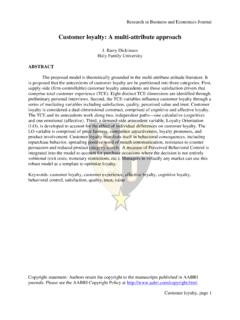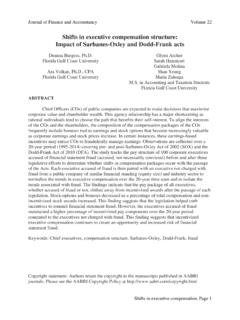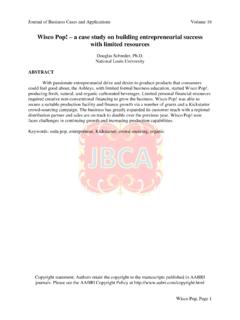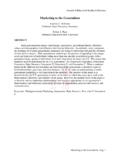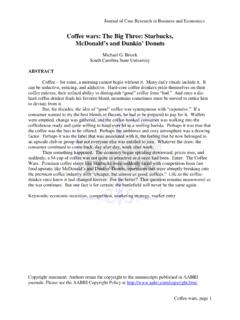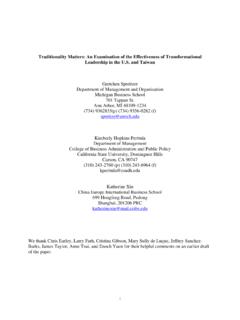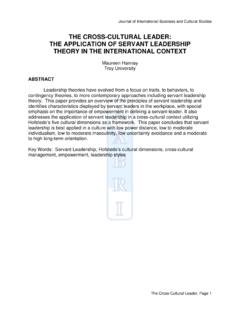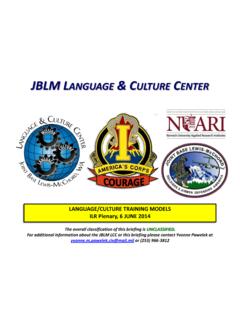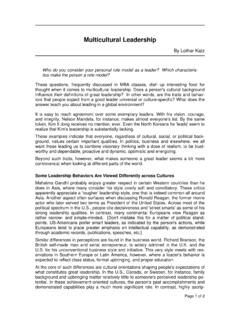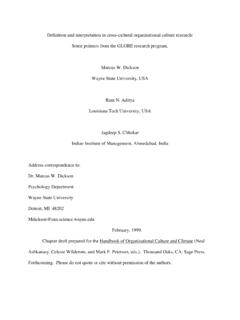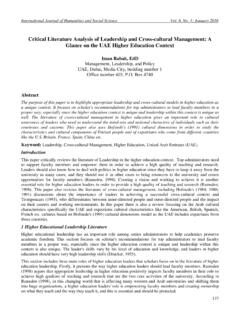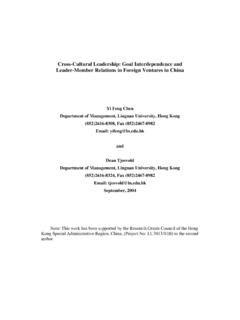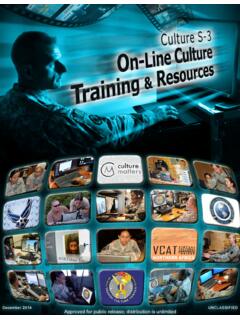Transcription of Educating global leaders: Exploring intercultural ...
1 Journal of International Business and cultural Studies Educating global leaders , Page 1 Educating global leaders : Exploring intercultural competence in leadership education Irving, Justin A. Bethel University Abstract The globalization of the world has brought about massive shifts over the past two decades. With the increase of international travel, the quantum leaps in global communication brought about by the World Wide Web and the increasingly interdependent global economy, the way leaders and organizations approach business has dramatically changed. While intercultural competence was once viewed as something only necessary for those engaged in direct international relations, today organizations face a need to equip the majority of their leaders and staff in effective intercultural competence.
2 This paper focuses on providing an overview of intercultural competence, engaging its critical importance for leaders , and providing examples and recommendations for how educational institutions may approach the development of intercultural competence in emerging leaders . Keywords: Leadership Education, Globalization, intercultural Competence, global leaders Journal of International Business and cultural Studies Educating global leaders , Page 2 Introduction More than ever before in history, the effects of globalization are being experienced around the world. The interconnectedness and interdependency of cultures is felt within and between the organizations, cultures, and societies of the world. One of the strongest evidences of globalization in this day is the interdependency of global economies.
3 Even as the author wrote this article in the fall of 2008, an RSS News Feed from MSNBC announced on his computer s desktop, World Stocks Fall on Economic Fear. This news feed went on to note that European stock markets opened sharply lower Wednesday following losses in Asia amid spreading pessimism over corporate earnings around the world. As one such report among many, it is easy to quickly identify the interdependent nature of the world. In this time of globalization, international businesses and global economies increasingly experience the rise and fall of their value together. Further illustrating the unique point we are in historically, House, Javidan, and Dorfman write, With the ongoing globalisation of the world s marketplace, there has been a shift from supplying overseas markets from a domestic base to establishing subsidiaries in numerous countries, acquiring or merging with foreign firms, or establishing international joint ventures (2001, p.)
4 489). In fact a recent KPMG study indicates that 41 percent of all mergers and acquisitions in 2000 were cross -boarder, and this compared to 24% in 1996 (Javidan, Stahl, Brodbeck, & Wilderom, 2005). While the fall of 2008 evidenced the challenges of interdependent markets, the beneficial effects of globalization are also astounding, providing opportunities that leaders around the world dare not ignore. With the rise of globalization, so rises the need for leaders with global perspective and intercultural competence to meet these growing challenges and opportunities. In light of this, this article will be focused on: (a) understanding the effects of globalization, (b) Exploring theoretical approaches to the understanding of culture and the development of intercultural competence in global leaders , (c) presenting one school s approach to Educating leaders in intercultural competence, and (d) providing recommendations for leadership educators aiming to meet the urgent need of preparing leaders to serve well in the face of globalization.
5 Globalization While cross - cultural interactions have been taking place for thousands of years, it is only within recent decades and the past century that the societies of the world have become more accessible. Advances in aviation arguably served as one of the first quantum leaps toward the present state of globalization we now experience. Alongside advances in transportation, however, the quantum advances in technology and communication driven by the introduction of the World Wide Web to public use have provided a powerful host for bringing the peoples of the world into close proximity and accessibility. Such advances in technology and improvements in telecommunication and transportation have enabled societies to quickly and easily learn about and from others (House, Javidan, Hanges, & Dorfman, 2002, p.)
6 3). Pointing to this experience of globalization at a corporate level of analysis, Javidan, Stahl, Brodbeck, and Wilderom (2005) note that cross -border transactions have exploded over the past 20 years along with the rapid globalization of economic activity. Supporting this, Kumar (2002) notes that worldwide foreign direct investment in 2000 was over $1,270 billion compared with $55 billion early in the 1980s. Over this same time period, international technology payments rose from $ Journal of International Business and cultural Studies Educating global leaders , Page 3 billion to over $60 billion (Javidan, Stahl, Brodbeck, & Wilderon), providing further evidence of the explosive influence of globalization on the world of business. In a treatment of negotiation in cross - cultural contexts, Beneke (1983) provides an early look at globalization trends.
7 In this work, Beneke cautions the international business traveler to not mistake the presence of touristic fares that make people feel at home with a universally homogeneous global culture. As the author of this article has taken in many of these fares experiences such as Pizza Hut and McDonalds on multiple continents, or Kentucky Fried Chicken in Shanghai the author has had to remind himself that while there are an increasing number of global brands, this does not translate into a homogeneous global culture. The presence of globalization forces people to see and embrace an increase of both similarities and differences in such intercultural interactions. With the addition of such complexities, it becomes even more important that global leaders understand the unique skills needed to lead in a global environment.
8 Javidan (2008a) argues that those working cross -culturally in a global environment have two major responsibilities. First, these individuals need to understand their own cultural lens. Second, and based upon the first, if individuals want to influence cross -culturally, they need to understand the other s cultural lens. While these reminders may be fairly basic, when missed, things can go very wrong. Javidan reminds people that cultural lens are like electricity; we really only pay attention to it when we don t have access to it. Bhawuk and Brislin (1992) argue that, To be effective in another culture, people must be interested in other cultures, be sensitive enough to notice cultural differences, and then also be willing to modify their behavior as an indication of respect for the people of other cultures (p.)
9 416). Such skills are not always intuitive for leaders engaged in globally oriented work. The need for specialized education whether formal or informal focused on developing intercultural competency is vitally needed in this day. Noting that no American corporation is immune from the impact of globalization, Javidan, Dorfman, Sully de Luque, and House (2006) argue for the priority of understanding global leadership as a critical success factor for large multinational corporations. Arguably, these comments are not just for the large multinational. Even smaller companies and organizations are increasingly touched by the impact of globalization. Large and small organizations alike are facing the reality that the global perspective of their leaders and managers is not sufficient to meet the demands of globalization.
10 In fact, one report indicates that while the demand for global business understanding continues to grow, nearly 85% of fortune 500 companies have reported a shortage of mangers with the necessary global skills (Gregersen, Morrison, & Black, 1998). This same report indicates that having competent global leaders was a highest priority concern for corporations when looking at factors for business success. In fact, the need for competent global leaders was rank higher than even adequate financial resources or technology, showing just how significant this consideration is for prominent corporations working to meet the demands of globalization. Culture and Leadership When looking at the discipline of leadership studies, it is easy to see why a focus on intercultural competence is necessary for successful initiatives in the global context.

